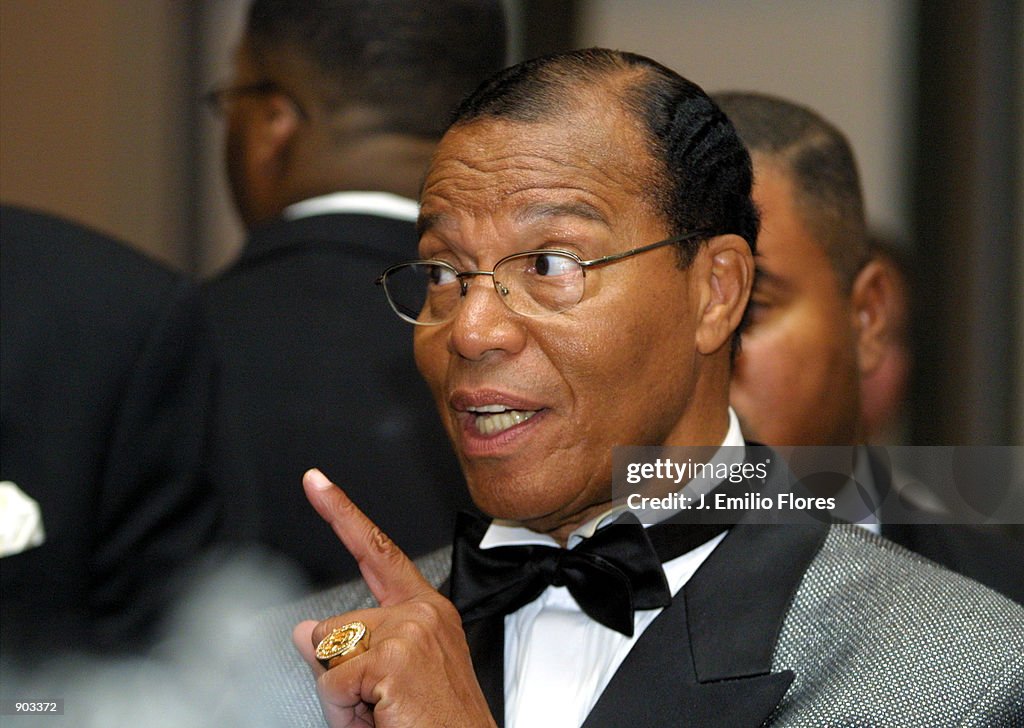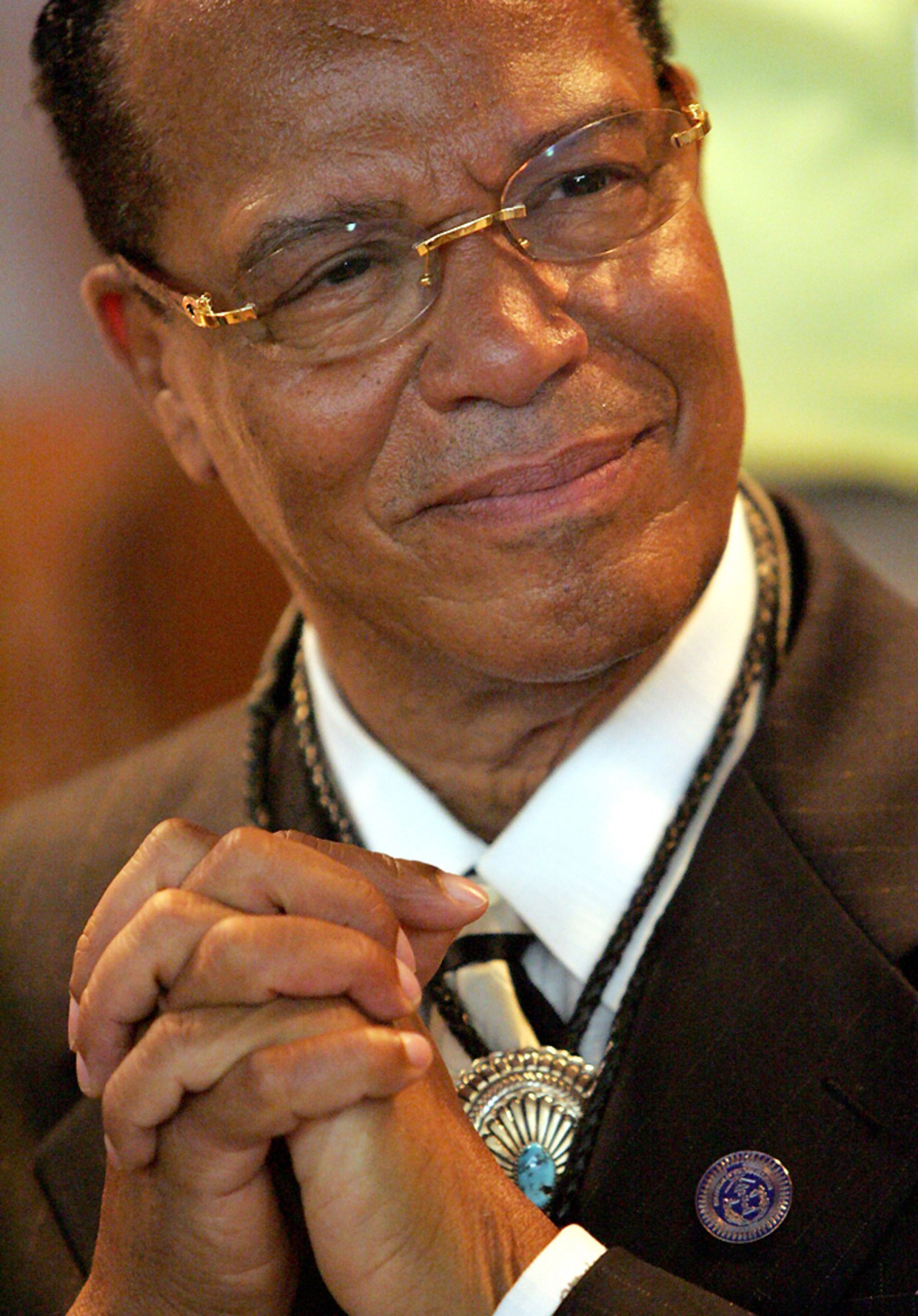Louis Farrakhan: A Voice That Shaped Modern Black Activism
When it comes to influential figures in the African American community, Louis Farrakhan's name stands out like a beacon of controversy and empowerment. Love him or hate him, there's no denying his impact on modern activism and social justice movements. This man has been a polarizing figure for decades, and his words continue to resonate with millions around the world. But who exactly is Louis Farrakhan, and why does he matter so much in today's conversations about race and equality?
Imagine a world where one man’s voice can ignite passion, spark debates, and inspire change. That's exactly what Louis Farrakhan has done throughout his life. From leading the Nation of Islam to delivering powerful speeches that challenge societal norms, this leader has carved out a unique place in history. Whether you agree with his views or not, his influence cannot be ignored.
This article dives deep into the life, teachings, and legacy of Louis Farrakhan, exploring both his achievements and controversies. We'll also touch on how his work continues to shape modern discussions about race and equality. So grab a cup of coffee, sit back, and let's explore the fascinating world of Louis Farrakhan together.
- Unveiling The Truth About Odia Mms Video A Deep Dive
- Savannah Demers Nude Unveiling The Truth Behind The Controversy
Table of Contents
- Biography of Louis Farrakhan
- Early Life and Background
- Rise to Power in the Nation of Islam
- Key Ideologies and Beliefs
- Major Speeches and Events
- Controversies Surrounding Louis Farrakhan
- Impact on Society and Modern Activism
- Legacy and Influence Today
- Criticisms and Opposition
- Conclusion: What Does the Future Hold?
Biography of Louis Farrakhan
Before we dive into the nitty-gritty details of his career, let's take a step back and look at the man behind the headlines. Born as Louis Eugene Walcott on May 11, 1933, in the Bronx, New York, Farrakhan grew up in a world vastly different from today’s America. His early years were marked by struggles typical of African American families during that era. But unlike many, Farrakhan found solace in music, becoming a talented violinist and calypso singer before embracing religion.
Personal Information
| Full Name | Louis Eugene Walcott (birth name), later Louis Abdul Farrakhan |
|---|---|
| Birthdate | May 11, 1933 |
| Place of Birth | Bronx, New York |
| Profession | Minister, Activist, Leader of the Nation of Islam |
| Spouse | Betty Farrakhan |
| Children | 9 children |
His journey from a musician to a spiritual leader is nothing short of remarkable. Farrakhan didn't just transition careers; he redefined his identity and purpose, aligning himself with the teachings of Elijah Muhammad and the Nation of Islam. This decision would set the stage for the rest of his life, making him one of the most recognizable faces in the fight for racial justice.
Early Life and Background
Growing up in the 1930s and 40s wasn't easy for anyone, especially for a young Black boy in America. Louis Farrakhan faced challenges that shaped his worldview early on. Despite these hurdles, he excelled academically and musically, even performing under the stage name "Calypso Gene" before joining the Nation of Islam.
- Lara Rose Leaked The Truth Behind The Headlines
- Jameliz Benitez Smith The Rising Star Whos Taking The World By Storm
It was during his teenage years that Farrakhan began questioning the world around him. The racial inequality he witnessed firsthand fueled his desire to seek answers. When he discovered the teachings of Elijah Muhammad, it felt like a revelation—a path toward understanding and empowerment. And thus began his transformation from a performer to a preacher.
Rise to Power in the Nation of Islam
After converting to the Nation of Islam, Farrakhan quickly rose through the ranks, proving himself to be a charismatic speaker and dedicated follower. By the late 1950s, he had become one of Elijah Muhammad's most trusted lieutenants. His speeches were electrifying, drawing crowds who were eager to hear his message of self-reliance and empowerment.
When Elijah Muhammad passed away in 1975, there was a power vacuum within the organization. Farrakhan played a crucial role in keeping the movement alive, eventually revitalizing the Nation of Islam in the 1980s. His leadership brought new energy and focus, ensuring that the organization remained relevant in an ever-changing society.
Key Ideologies and Beliefs
At the heart of Louis Farrakhan's teachings lies a commitment to Black empowerment and self-determination. He advocates for economic independence, education reform, and community building. These ideas aren't just abstract concepts; they're rooted in practical solutions designed to uplift marginalized communities.
- Economic Empowerment: Farrakhan encourages African Americans to invest in their own businesses and support each other financially.
- Education: He believes strongly in providing quality education to Black youth, emphasizing the importance of history and culture.
- Self-Reliance: One of his core messages is that Black people must rely on themselves rather than waiting for others to solve their problems.
These ideologies have resonated with countless individuals over the years, inspiring them to take action in their own lives and communities.
Major Speeches and Events
Throughout his career, Farrakhan has delivered numerous speeches that have left lasting impressions on his audience. Perhaps the most famous of these is the Million Man March, held in Washington D.C. in 1995. This event brought together hundreds of thousands of African American men, symbolizing unity and strength in numbers.
His words during this march continue to inspire people today, reminding them of the power they hold when they stand together. Other notable speeches include those addressing topics like police brutality, systemic racism, and international relations—all delivered with the same passion and conviction that defines his style.
Controversies Surrounding Louis Farrakhan
No discussion about Louis Farrakhan would be complete without acknowledging the controversies that have followed him throughout his career. Critics often point to his past comments on Judaism, homosexuality, and other sensitive subjects as evidence of intolerance. While some view these statements as inflammatory, others argue that they reflect a broader critique of societal structures.
Farrakhan himself has addressed these criticisms head-on, explaining his positions and encouraging open dialogue. Whether you agree with him or not, there's no denying that his willingness to tackle tough subjects has kept him at the forefront of public discourse.
Addressing Misunderstandings
It's important to note that Farrakhan has repeatedly clarified his views, emphasizing the need for context and understanding. For example, his comments on religion should be viewed within the framework of his broader philosophy rather than taken out of context.
Impact on Society and Modern Activism
The influence of Louis Farrakhan extends far beyond the confines of the Nation of Islam. His ideas have permeated mainstream conversations about race, inspiring movements like Black Lives Matter and others fighting for equality. By challenging the status quo and demanding change, Farrakhan has helped shape the landscape of modern activism.
Young activists today draw inspiration from his unwavering dedication to justice, using his methods as a blueprint for their own campaigns. In many ways, Farrakhan's legacy lives on through the work of those who continue to push for a more equitable society.
Legacy and Influence Today
As we look to the future, it's clear that Louis Farrakhan's impact will endure for generations to come. His contributions to the struggle for racial equality have left an indelible mark on history, one that cannot be erased. While opinions about him may vary, his role in shaping contemporary discussions about race and justice remains undeniable.
Today, Farrakhan continues to speak out on issues affecting the Black community, using his platform to amplify voices that might otherwise go unheard. His legacy serves as a reminder of the power of perseverance and the importance of standing up for what you believe in.
Criticisms and Opposition
Of course, no leader is without detractors, and Farrakhan is no exception. Some critics accuse him of promoting divisive rhetoric, while others question the effectiveness of his strategies. These criticisms highlight the complexities of leading such a high-profile movement and underscore the challenges faced by anyone trying to effect real change.
Despite these criticisms, Farrakhan remains steadfast in his convictions, continuing to advocate for the causes he believes in. His ability to withstand criticism and maintain his focus is a testament to his strength and resilience.
Conclusion: What Does the Future Hold?
In conclusion, Louis Farrakhan's life and career represent a complex tapestry of triumphs and challenges. From his early days as a musician to his current status as a leading voice in the fight for racial justice, he has consistently pushed boundaries and inspired others to do the same.
As we move forward, it's crucial to recognize the lessons Farrakhan's life offers us. His emphasis on self-reliance, education, and community building provides a roadmap for creating lasting change. So whether you're a long-time follower or just discovering his work, there's much to learn from the man known simply as Minister Farrakhan.
Now it's your turn—what are your thoughts on this iconic figure? Leave a comment below or share this article with friends who might appreciate gaining a deeper understanding of one of the most influential leaders of our time. Together, we can keep the conversation going and honor the legacy of Louis Farrakhan.
- Lela Sohna Nude The Truth Behind The Headlines And Sensationalism
- Jameliz Smith The Rising Star In The Adult Entertainment Industry
User Clip Al Sharpton, Louis Farakhan speeches

Minister Louis Farakhan mingles after a classical music concert that

Did everyone know Farakhan has a white dad? Page 3 Lipstick Alley